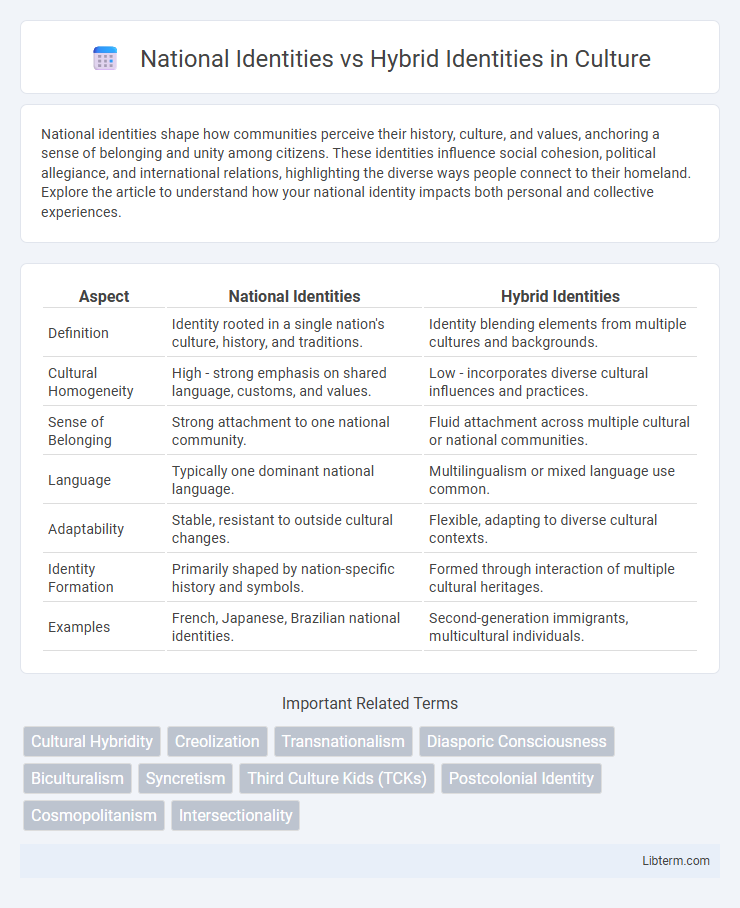National identities shape how communities perceive their history, culture, and values, anchoring a sense of belonging and unity among citizens. These identities influence social cohesion, political allegiance, and international relations, highlighting the diverse ways people connect to their homeland. Explore the article to understand how your national identity impacts both personal and collective experiences.
Table of Comparison
| Aspect | National Identities | Hybrid Identities |
|---|---|---|
| Definition | Identity rooted in a single nation's culture, history, and traditions. | Identity blending elements from multiple cultures and backgrounds. |
| Cultural Homogeneity | High - strong emphasis on shared language, customs, and values. | Low - incorporates diverse cultural influences and practices. |
| Sense of Belonging | Strong attachment to one national community. | Fluid attachment across multiple cultural or national communities. |
| Language | Typically one dominant national language. | Multilingualism or mixed language use common. |
| Adaptability | Stable, resistant to outside cultural changes. | Flexible, adapting to diverse cultural contexts. |
| Identity Formation | Primarily shaped by nation-specific history and symbols. | Formed through interaction of multiple cultural heritages. |
| Examples | French, Japanese, Brazilian national identities. | Second-generation immigrants, multicultural individuals. |
Understanding National Identities
National identities are collective constructs that define a group's shared sense of belonging based on common language, culture, history, and territorial boundaries. These identities often shape social cohesion and political allegiance within a nation-state, influencing individuals' perception of self and others. Understanding national identities involves examining the symbolic narratives, traditions, and institutions that foster a unified collective identity among diverse populations.
The Concept of Hybrid Identities
Hybrid identities emerge from the blending of multiple cultural, ethnic, or social backgrounds, challenging the fixed boundaries of traditional national identities. This concept emphasizes fluidity, intersectionality, and the coexistence of diverse influences within an individual or community, reflecting globalization and transnational connections. Hybrid identities often resist singular categorization, embracing complexity and the dynamic nature of identity formation in contemporary society.
Historical Evolution of National Identities
National identities have evolved through centuries of shared language, culture, and historical experiences, often rooted in the formation of early modern nation-states during the 16th and 17th centuries. The rise of nationalism in the 19th century solidified distinct national identities, emphasizing cultural homogeneity and territorial sovereignty. In contrast, hybrid identities emerge from globalization, migration, and intercultural exchanges, challenging the fixed boundaries of traditional national identities by blending multiple cultural and ethnic influences.
Drivers of Hybrid Identity Formation
Cultural globalization, migration patterns, and increasing digital connectivity act as primary drivers of hybrid identity formation by blending traditional national identities with diverse cultural influences. Exposure to multiple languages, customs, and social norms fosters a dynamic sense of self that transcends singular national affiliation. Educational systems and transnational networks further reinforce this hybridization by promoting cross-cultural awareness and interaction.
Globalization and Identity Transformation
Globalization accelerates the shift from rigid national identities to fluid hybrid identities by fostering cross-cultural interactions and digital connectivity. Hybrid identities emerge through the blending of cultural elements, enabling individuals to navigate multiple social, ethnic, and linguistic affiliations simultaneously. This transformation challenges traditional notions of identity, emphasizing flexibility, diversity, and global interconnectedness in personal and collective self-perception.
National Pride vs. Cultural Fluidity
National pride often emphasizes a unified, stable identity tied to specific symbols, traditions, and shared history, reinforcing a collective sense of belonging within defined borders. In contrast, cultural fluidity reflects hybrid identities that blend multiple ethnic, linguistic, and social influences, fostering adaptability and cross-cultural connections. This dynamic tension highlights how individuals negotiate between preserving national heritage and embracing diverse, evolving cultural expressions.
The Impact of Migration on Identity
Migration reshapes national identities by introducing diverse cultural influences that challenge traditional notions of homogeneity, leading to the emergence of hybrid identities that blend elements from multiple origins. This dynamic process enhances social cohesion in multicultural societies while also provoking debates about belonging and cultural preservation. Statistical data from migration studies reveal increasing growth of hybrid identity formations, particularly in urban centers with high immigrant populations, demonstrating the transformative impact of human mobility on identity construction.
Challenges Facing Hybrid Identities
Hybrid identities face challenges such as cultural dissonance, social exclusion, and identity confusion due to conflicting national narratives and expectations. These identities often struggle with acceptance in societies that prioritize singular national identity, leading to marginalization and discrimination. Navigating legal, social, and psychological pressures complicates the hybrid individual's sense of belonging and self-definition.
Identity Politics in a Multicultural World
National identities often emphasize a shared heritage, language, and cultural traditions that unify members within a defined territorial boundary, reinforcing collective belonging and political representation. Hybrid identities emerge from the intersection of multiple cultural influences, reflecting the fluid and pluralistic realities of individuals navigating ethnic, linguistic, and social diversities in a globalized context. Identity politics in a multicultural world challenge rigid categorizations by promoting recognition of complex, overlapping identities that demand inclusive policies and equitable representation across diverse communities.
Future Trends in Identity Construction
Future trends in identity construction reveal a shift from rigid national identities toward increasingly hybrid identities shaped by globalization, digital connectivity, and multicultural interactions. Emerging technologies like virtual reality and social media platforms enable individuals to negotiate and express multiple layers of identity beyond geographic or ethnic boundaries. This evolving dynamic fosters more fluid and adaptive self-conceptions, blending traditional cultural markers with transnational influences.
National Identities Infographic

 libterm.com
libterm.com